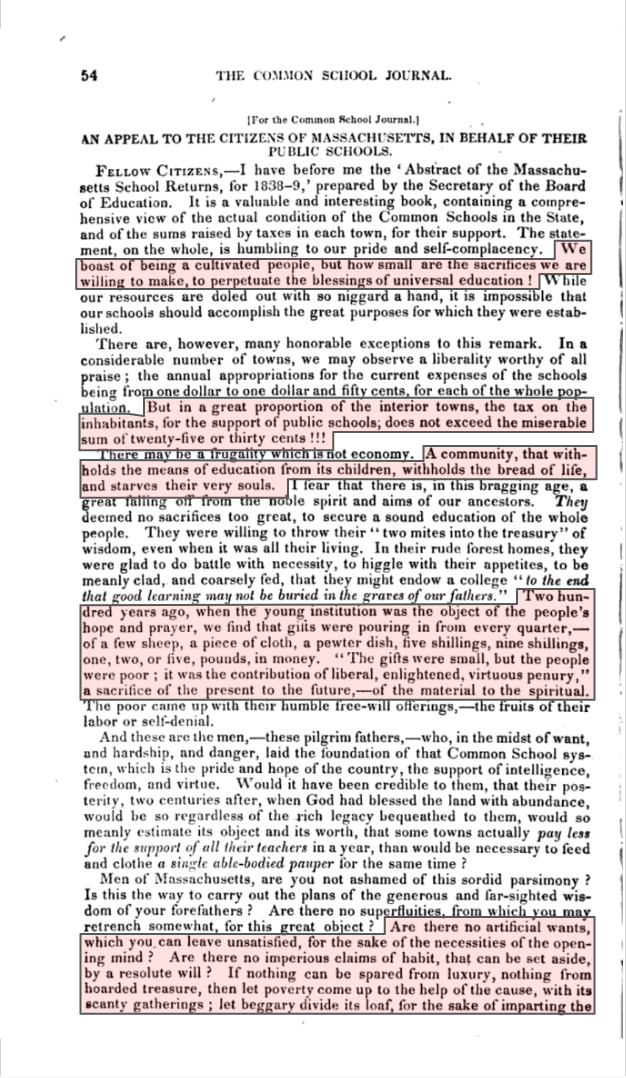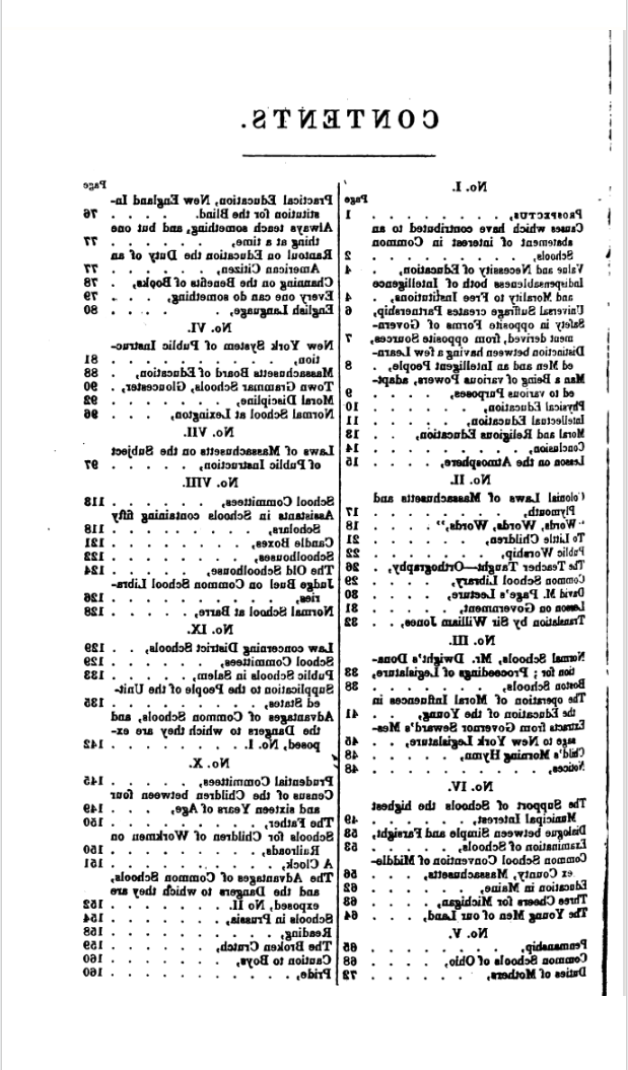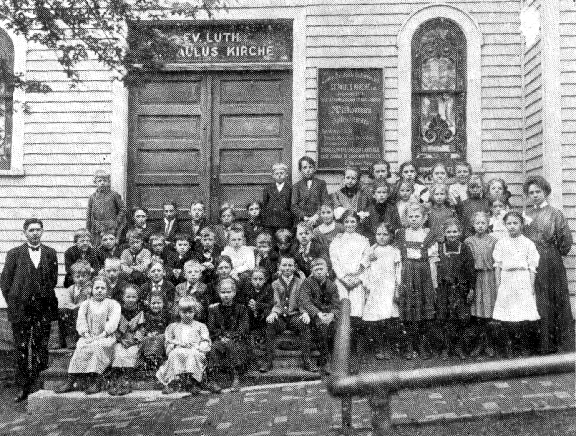"Citizens cannot maintain both ignorance and freedom."
(Common School Journal, Horace Mann, 1839)

The Common School Movement

[Students in a classroom, Boston Pictoral Archive, 1890]
Horace Mann would go on to spearhead the Common School Movement, a movement pushing for universal public education in America.
Promotion
In 1837, Horace Mann was appointed secretary of the Massachusetts Board of Education — the first in the country.
The board's power was very limited—it could only advocate to increase school budgets and teacher wages—which indicated a lack of public interest in education.
So, in addition to legislative advocacy, Mann had "to change the apathy and indifference of the people toward the common schools into appreciation and active interest." (The Evolution of the Massachusetts Public School System, George Henry Martin, 1915)
Without legal power, Mann used the moral authority of his position to promote improved schooling in Massachusetts and across the nation.
"In order to attain his purpose, Mann announced that in each county in the state, there should be held a convention which he attended. At these conventions he was able to get statistics as to the number of schools, the number of students attending, the number of teachers, the cost of the supplies, and the condition of the school-houses. By making direct contacts with the school board members and the school teachers, Mann had succeeded in arousing interest in education throughout the state."
(Horace Mann and His Educational Activities as Correlated with the Social and Economic Conditions in 1837, Elizabeth F. Foley, 1937)
To further propagate his ideas, Mann lectured across the nation and started the Common School Journal, which gave teachers advice about education.
"[Mann's journals] are among the best expositions, if indeed, they are not the very best ones, of the practical benefits of a common school education both to the individual and to the state."
(Horace Mann and the Common School Revival in the United States, B. A. Hinsdale, 1898)
View excerpts from the Journal below...
Open the Journal |   Click the red passages ⬊ [Common School Journal, Horace Mann, 1839] |
New Perspectives
A pivotal moment in public education reform was Horace Mann's 1843 trip to Europe.
While abroad, Mann was impressed by the teaching methods of nations such as Prussia.

[A Prussian School, Bernie Attema]
European schools focused less on corporal punishment and more on "secular education," "a curriculum that introduced knowledge of technology and science," and "a curriculum designed to inculcate a strong national identity." (The Evolution of the Massachusetts Public School System, George Henry Martin, 1915)
Furthermore, students seemed to express a genuine joy for learning.
Mann promoted the ideas he saw in Europe in his lectures and Journal.
"In Prussia, and in those parts of Germany where the subject of education is best understood, the Lancasterian method of instruction (corporal punishment) is most condemned."
"In Prussia much excellent moral instruction, in addition to the doctrinal, is given in the schools."
(Common School Journal, Horace Mann, 1844)
Universality
In addition to his ideas for improving individual schools, Horace Mann had plans for the school system as a whole.
Mann criticized education systems designed to produce "one man, unmatched elsewhere in his department of learning — one man who could read twenty foreign languages — one prodigy of genius... No ambition, no competition, to spread it amongst the people." (Common School Journal, Horace Mann, 1839)
"What a chorus for the triumph of intellect was sung, by the most civilized and learned nation in the old world, when one of its astronomers discovered a planet in the distant regions of space, though millions of its people were suffering under debasing superstitions, derived from heathen astrology."
(Common School Journal, Horace Mann, 1839)
Mann argued that mass education was much more valuable than cultivating a select few and dooming the rest to ignorance.
[A Political Cartoon about Common Schools' Diverse Children, Gilder Lehrman Institute of American History, ca. 1870 ]
He envisioned a common school system with a universal schooling standard, allowing all children—even those who weren't wealthy white males—to receive a high-caliber education. To accomplish this, Mann proposed six main universal education principles in his Journal.
"Citizens cannot maintain both ignorance and freedom."
(Common School Journal, Horace Mann, 1839)
"This education should be paid for, controlled, and maintained by the public."
(Common School Journal, Horace Mann, 1839)
"This education should be provided in schools that embrace children from varying backgrounds."
(Common School Journal, Horace Mann, 1839)
"This education must be nonsectarian."
(Common School Journal, Horace Mann, 1839)
"This education must be taught using tenets of a free society."
(Common School Journal, Horace Mann, 1839)
"This education must be provided by well trained professional teachers."
(Common School Journal, Horace Mann, 1839)
Many Americans agreed with Mann's notions and started to push for comprehensive public education reform.
Opponents
However, Mann also faced fierce opposition from various groups.
His main opponents were Roman Catholics who believed that common schools—which had Protestant origins—were inherently anti-Catholic.
"Prayers, songs and general religious instruction at odds with Catholic belief were the norm. Anti-Catholic sentiments extended throughout the [common school] curriculum with references to deceitful Catholics, murderous inquisitions, vile popery, Church corruption, conniving Jesuits and the pope as the anti-Christ of Revelation commonplace."
(Anti-Catholicism and the History of Catholic School Funding, 2017)
Others raised concerns about government overreach — sentiments that still echo today.
"A desire to maintain strict local control over schools put many advocates of statewide organization on the defensive. Intermixed with class, race, and ethnic tensions, demands for local control of schools was–and remains–a hotly contested issue. Opposition to taxation, raised as an objection to publicly financed schemes of education during the colonial period, continued to provoke resistance. Related to issues of control and taxation were charges that government involvement in education was a repudiation of liberalism and parental rights. Advocates of this position championed the right of individuals to be left alone and responsible for their own lives.
(Common School Movement, State University)